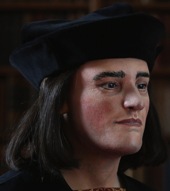
Facial Reconstruction of Richard III (used by permission of the Richard III Society)
An unforgettable event:
Press Conference at the University of Leicester – it is Richard III!
A press conference at the University of Leicester was specially convened on 4 February 2013. At 10h40 (local time) it was announced that the human remains found during the archaeological dig in the area of Leicester’s Greyfriars were those of King Richard III.
The identification was based on a wealth of scientific evidence, including radiocarbon dating, radiological evidence, DNA and bone analysis and archaeological results.
In conclusion to a presentation of the various strains of evidence, Richard Buckley, the lead archaeologist on the Search for Richard III, said: “It is the academic conclusion of the University of Leicester that the individual exhumed at Grey Friars in August 2012 is indeed King Richard III, the last Plantagenet King of England.” *
You can watch and listen to the whole press conference again at http://www2.le.ac.uk/news/blog/2013/february/watch-or-listen-to-the-richard-iii-press-conference-online
* ‘University of Leicester announces discovery of King Richard III’, University of Leicester (4 Feb 2013). URL: http://www2.le.ac.uk/offices/press/press-releases/2013/february/university-of-leicester-announces-discovery-of-king-richard-iii [last accessed 1 Feb. 2020]
Tags: Leicester, Leicester Greyfriars Dig, Richard III

Johannes Gutenberg
Death of Johannes Gutenberg, the inventor of the printing press
The death of Johannes Gutenberg occurred on 3 February 1468 in Mainz.
Johannes Gensfleisch zur Laden zum Gutenberg, his full name, was born c. 1398 in Mainz. In approx. 1439 he invented a mechanical printing press using moveable type. This was later, in 1476, introduced into England by William Caxton. The invention of the printing press is regarded as one of the most important developments in the history of mankind as it allowed the fast dissemination of written texts.
A fascinating novel about the first printed Bible is Gutenberg’s Apprentice by Alix Christie. You can find a review here.
More information on Johannes Gutenberg:
Tejvan Pettinger, ‘Biography of Johannes Gutenberg’, Biography Online (28 December 2012). URL: http://www.biographyonline.net/business/j-gutenberg.html [last accessed 1 Feb. 2020]
Dorothea Preis
Tags: Books
Comments Off on Death of Johannes Gutenberg

John of Gaunt, Duke of Lancaster
Death of John of Gaunt, Duke of Lancaster – ancestor of the Lancastrian Kings and the Tudors
The death of John of Gaunt occurred on 3 February 1399 at Leicester Castle.
He was the third surviving son of Edward III and Philippa of Hainault. He was born on 6 March 1340 in Ghent, which why he was called ‘of Gaunt’.
His first wife was Blanche, the daughter of Henry of Grosmont, 1st Duke of Lancaster. They married in 1359. His father gave him the title Duke of Lanacster in 1362 after the death of his father-in-law. Their eldest son surviving infancy was Henry Bolingbroke, who would later become the Lancastrian king Henry IV.
After Blanche’s death in 1369, he married the Infanta Constance of Castile in 1371. She died in 1394.
With Katherine de Roet he is the ancestor of the Beaufort family. The children were born when Katherine was his mistress. However, Katherine and John married in 1396 and the children were legitimised. Their half-brother Henry IV barred the Beauforts from the succession to the throne. The later fact was conveniently forgotten by Margaret Beaufort and her son Henry Tudor, when he aimed to become king (Henry VII). Katherine and her relationship with John of Gaunt is the subject of Anya Seton’s unforgettable novel Katherine.
More information:
Richard Cavendish, ‘Death of John of Gaunt‘, History Today (2 February 1999). [last accessed 1 Feb. 2020]
John of Gaunt, duke of Lancaster, Encyclopaedia Britannica
Dorothea Preis
Tags: John of Gaunt
 Battle of Mortimer’s Cross, Herefordshire – Edward on the way to the throne
Battle of Mortimer’s Cross, Herefordshire – Edward on the way to the throne
The Battle of Mortimer’s Cross was fought on 2 February 1461 in Herefordshire, It was an important battle in the Wars of the Roses.
In the Battle of Mortimer’s Cross the Yorkists were led by 18-year-old Edward, Earl of March (later Edward IV). They intercepted a Lancastrian forces led by Owen Tudor and his son Jasper into England. The Lancastrians outnumbered the Yorkists considerably and were better mounted and armed. The Yorkists were encouraged by a parhelion, a meteorological phenomenon in which three suns appear. This is the origin of Edward’s badge ‘The Sun in Splendour’.
Unfortunately the Battle of Mortimer’s Cross is not very well documented. The fighting must have been ferocious in adverse weather conditions in the middle of winter.
After the battle Owen Tudor was captured and executed in Hereford, along with other prisoners of rank.
To find out more:
Battle of Mortimer’s Cross, Battlefields Resource Centre.
Jennifer Young, ‘The Mortimer’s Cross Parhelion: How a Meteorological Phenomenon Changed English History’, Decoded Science (12 Nov. 2019). URL: http://www.decodedscience.com/the-mortimers-cross-parhelion-how-a-meteorological-phenomenon-changed-english-history/3437 [last accessed 1 Feb. 2020]
Dorothea Preis
Tags: Edward IV, Wars of the Roses, Yorkists

Battle of Wakefield
The Battle of Wakefield was fought on 30 December 1460 in West Yorkshire. Richard Plantagenet, 3rd Duke of York, and Edmund, Earl of Rutland, father and brother of Edward IV and Richard III, were killed. Also killed was Richard Neville, 5th Earl of Salisbury. Their heads were stuck on poles and displayed over Micklegate Bar, York, the Duke wearing a paper crown.
For a thorough analysis of the battle read Helen Cox, The Battle of Wakefield Revisited: A Fresh Perspective on Richard of York’s Final Battle, December 1460. You can read more on Helen’s website here.
And for visitors we recommend: Helen Cox, Walk Wakefield 1460: A Visitor Guide to Battle-Related Sites
A short description of the various battles of the Wars of the Roses can be found on the website of the Richard III Society (you need to scroll down a bit).
Dorothea Preis
Tags: Battles, Nevilles, Richard Duke of York, Wakefield, Wars of the Roses
Comments Off on Battle of Wakefield
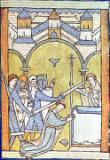
Murder of Thomas Becket from an English psalter.
Murder of Thomas Becket
On 29 December 1170, Archbishop Thomas Becket was murdered in Canterbury Cathedral by four knights.
More information here.
Tags: Church
Comments Off on Murder of Thomas Becket
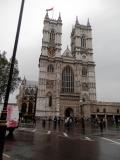
Westminster Abbey (© D Preis)
Westminster Abbey Consecrated
On 28 December 1065, Westminster Abbey was consecrated under Edward the Confessor.
More information on Edward the Confessor and Westminster Abbey here.
Tags: Church
Comments Off on Westminster Abbey Consecrated
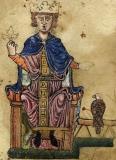
Frederick II (from ‘De arte venandi cum avibus’)
Birth of Frederick II
Frederick of Hohenstaufen, later Frederick II, was born on 26 December 1194 in Iesi, near Ancona, Italy, the son of the Emperor Henry VI. He was crowned Holy Roman Emperor Frederick II in 1220. He was one of the most powerful Emperors. He was an influential supporter of science and the arts. He died on 13 December 1250.
You can find the Encyclopaedia Britannica entry on Frederick II here.
Tags: Germany, Italy
Comments Off on Birth of Frederick II
Wishing all our readers a very merry Christmas
and lots of happiness and peace for the New Year.

Enjoy a carol from King’s College Chapel in Cambridge (click here).
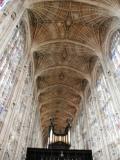
Richard III was a generous benefactor of the building of the chapel, which had been started by Henry VI. By the end of his reign the first six bays of the Chapel had reached full height and the first five bays, roofed with oak and lead, were in use. [1] It was the Tudor kings, Henry VII and Henry VIII, who would eventually finish the chapel.
Note:
‘History of the Chapel’, King’s College Cambridge. URL: http://www.kings.cam.ac.uk/chapel/history.html [last accessed 23 November 2018]
Tags: Cambridge, Christmas, Richard III
Comments Off on Season’s Greetings to all our readers
 Death of Edward Plantagenet (Richard of Eastwell) at Eastwell. He is said to have claimed to be an illegitimate son of Richard III.
Death of Edward Plantagenet (Richard of Eastwell) at Eastwell. He is said to have claimed to be an illegitimate son of Richard III.
Tags: Richard III
Comments Off on 22 DECEMBER 1550










